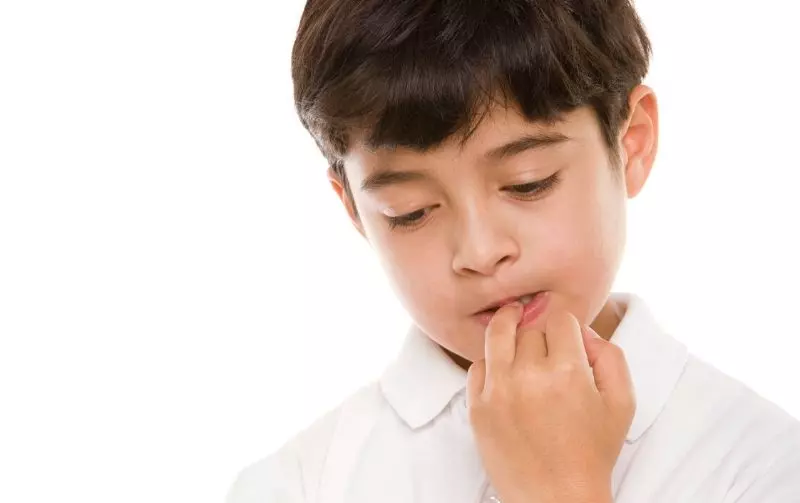Onychophagia is a medical term used for nail biting. It is mostly overlooked and a bad habit in children, while in reality, it could be something more than just a habit associated with some stress-related behaviours. Onychophagia is an urge to bite fingernails, cuticles or skin around the nails. It is one of the body-focused repetitive behaviour (BFRB) in which a person compulsively keeps touching, picking, biting or grooming themselves and end up doing physical damage. In onychophagia, a person keeps biting their nails, which can lead to uneven, ugly, deformed nails.
This behaviour develops at an early age and could outgrow after some time, but in some cases, it can become severe as the person ages. According to research, about 28-33% of children aged 7-10 years and around 45% of teenagers are involved in onychophagia. There are several treatments that we are going to discuss below that you can opt for your child.
Knowing the root cause of a problem can significantly help you deal with it. So, before judging your kid for being onychophagic, it is better to know the cause of their behaviour to help them solve their problem better. This article will give you an insight into onychophagia and guidelines that you can follow to stop onychophagia naturally in your kid.
Symptoms Of Onychophagia
Symptoms of onychophagia can vary from person to person. You may notice that your child feels uncomfortable before biting his/her nails, a feeling of pleasure or accomplishment after onychophagia, injuries, bleeding, infections around fingers, uneven nails, ingrown nails, mouth infection, and teeth misalignment.
Causes Of Onychophagia
The exact cause of onychophagia is not defined. It can vary from person to person. Below are the most common causes of onychophagia. Give them a read and figure out what could be the possible cause of onychophagia for your kid.
Stress/Anxiety Could Be a Cause Of Onychophagia
According to The American Journal of Orthodontics and Dentofacial Orthopaedics, a person can get involved in onychophagia as a coping behaviour for stress, anxiety, loneliness, boredom or separation anxiety. Try to observe the surroundings in which your kid spends time to determine if there is anything that bothersome. Kids may get stressed if their parents keep arguing in front of them, get bullied at school complicated family system, or are a result of divorced parents. Take some time to talk to your kid and figure out the root cause of their behaviour.
Low Self-Esteem Can Trigger Onychophagia In Children

Some kids may develop onychophagia because of low self-esteem. Kids are very sensitive and feel things on a deeper level. If you do not support your kid and keep mocking them in front of others for biting their nails, they may feel embarrassed and shamed for outgrown, uneven nails and may end up biting their nails for the sake of self-grooming so no one can disgust them for their physical appearance.
Read Also: HCAhrAnswers Login at Hcahranswers.com
Kids Bite Their Nails When They Are Nervous Or Fearful
Onychophagia is the most common nervous habit seen among children. It is reported that people tend to bite their nails more when they are nervous or fearful about something. Your kid may be dealing with academic pressure, nervous about his test results, or may have picked a fight with someone at school.
Imitation As A Possible Cause Of Onychophagia
Yes, imitation can be a possible cause for your kid to get involved in onychophagia. Kids learn from their surroundings a lot, and they love to try new and different things. If any other kid or adult indulges in onychophagia, chances are that your kid will copy them and develop this habit.
Genes Can Be A Potential Cause Of Onychophagia
You must be thinking that what on earth genes have to do with onychophagia. But the truth is the possibility of getting this habit from parents, not by observations but because of genetics. Some studies suggest that if parents had stopped onychophagia long before their kids were born, it is possible that their kids may develop it as a genetic disposition.
Onychophagia As Attention-Seeking Behavior

A child wants the undivided attention of their parents. If you are a working lady or expecting a second baby, hardly sparing time for your child, it is possible that your kid will develop onychophagia to seek your attention. Kids indulge in onychophagia when they feel lonely, depressed, or unloved.
Hunger And Sleep Deprivation As a Clue For Onychophagia
A study conducted in 2010 suggested that people tend to bite their nails when they are hungry or do not get enough time to sleep. Your kid may be doing this because of hunger or an improper sleep cycle. Keep track of your child’s sleep cycle. Kids nowadays spend most of their time video gaming or on social media, which leaves them sleep-deprived.
Side Effects Of Onychophagia
You may consider onychophagia as just a bad habit of your kid, or you may consider your kid stubborn. But it could get worse if left unattended, harming your kid mentally and physically and limiting their social activities. Excessive biting of fingernails can damage the nail, cuticle, skin, and tissues that are responsible for nail growth, making them more prone to infections, germs, and bleeding. Frequent physical contact of hands with the mouth can transfer infection, germs, and dirt to the mouth, which can lead to stomach and intestinal infections.
If psychological factors are a cause of onychophagia in your kid, it is possible that he or she may develop a mental disorder if left unnoticed. A study conducted in 2011 proved a positive correlation between other psychiatric disorders and onychophagia. It showed that people suffering from onychophagia might have attention deficit hyperactivity disorder, oppositional defiant disorder, and separation anxiety disorder. Other than that, your kid may also experience low self-esteem, limit social interactions, feel lonely and depressed, and lose confidence.
How To Stop Onychophagia In Children

Firstly, you must understand that it is hard to break a habit and be patient with your kid. Go easy with your kid. Try to understand what he/she must be going through while biting nails. Know that changes do not happen overnight, so giving enough time to break the habit will help your kid. Tell your kid that you understand the behaviour and will try to help get rid of it. Try to take your kid on board while opting for any therapy to treat onychophagia because otherwise, your concern and care for your child can backfire, and your kid can misunderstand your care for being dominant or uncompassionate and may develop other oppositional defiant disorders.
Trimming Nails Regularly Can Stop Onychophagia
The first thing you can do is to regularly trim your child’s nails. Short nails are hard to bite on, and if your kid indulges in onychophagia as a purpose of self-grooming, not to feel embarrassed of untidy nails, then he or she will not bite nails if they are already properly trimmed. Your kid is likely not to bite nails if he or she is conscious that you are going to check nails on the next trimming session.
Treating Onychophagia With Family Support
Try to understand your kid’s behaviour and do not mock them in front of others. Shaming kids for something they are having a hard time controlling will not help them but put a negative strain on their mental health. Be compassionate and make them feel loved for who they are.
Educate Your Kid About Onychophagia
If you want your kid to break this habit, you have to explain to your kid what potential health risk onychophagia can have. There are higher chances of success if you logically explain things to your kid and let them decide what is good for them instead of forcing them into something. Tell them that biting nails is very unhygienic and can make them ill. In this way, you can help your kid stop onychophagia.
Providing Distraction To Eradicate Onychophagia
If stress is a cause for onychophagia in your kid, then providing alternate stress busters can help your child break the habit. You can keep their hands busy with painting, story books, dough making, fidget spinners, and stress balls. Manage their meal times so they avoid getting the urge to bite their nails as a hunger buster. Every time you see your kid taking their hand to the mouth, instead of scolding them, give them a warm wave with a sweet smile so they will be distracted by waving back at you.
Ensure To Spend Quality Time With Your Child
Besides your busy schedule, try to spare some quality time for your child so they will not feel alone, bored or depressed. Kids are very sensitive; all they want is your undivided attention and love. Make them realize that all of your time and attention is for your kid. So they will not hesitate to communicate about things that bother them.



